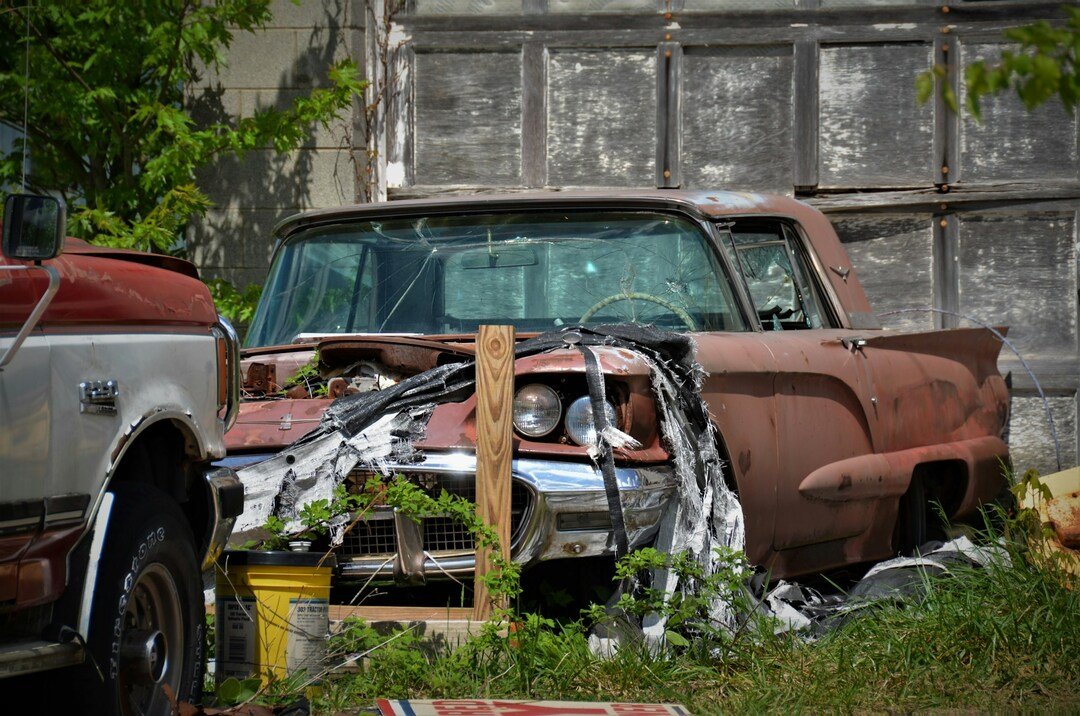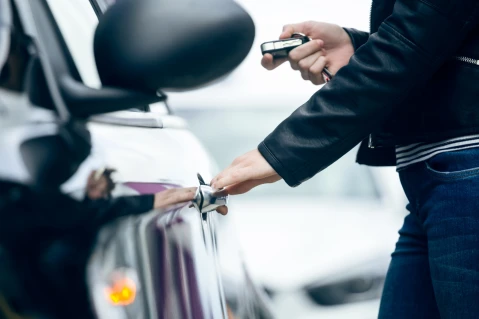What Is a Salvage Title Car?
A salvage title is issued when an insurance company declares a car a total loss. If you have this car title, it means your automobile was in a catastrophic accident and sustained serious damage. The insurance company has determined that the cost of fixing the vehicle exceeds the value of the vehicle.
Following the settlement of your damage claim, the insurance company may occasionally remove the car for repair, reconstruction, or resale, but there are several circumstances in which the owner may be permitted to keep the car. Your vehicle receives a new title in this scenario.
While the details of owning a salvage title car will differ depending on the laws in your state, there are some things you should know about these salvage title vehicles. A salvage title can affect your insurance rates, how you drive, and your ability to legally drive or resell your automobile in the future. Hence, it's important to know the salvage title meaning, how it works, as well as the benefits and risks of buying a salvage title car.
What Does a Salvage Title Mean?
If you own a salvage title car, it means that it is not worth much money in its current condition. Usually, this is the consequence of automobile-related damage, although not always. An automobile, for instance, might sustain irreparable damage in a fire or due to flood damage. Some vehicles are deemed salvaged because they were stolen, vandalized, or even had components taken.
There are, however, certain exceptions. If a previous owner utilized your automobile as a taxi, police car, or law enforcement vehicle, for instance, the title may be considered salvage. Some automobiles that have been sold again after being repaired or resold under warranty fall into this category as well. Knowing the vehicle's history is essential if you own or want to purchase a salvage-titled vehicle.
Is It a Good Idea to Buy a Salvage Title Vehicle?
While buying a salvage title car might help you save money, there are also some serious risks involved. People are wary of purchasing vehicles with salvage titles for a variety of red flags. Significant risks of purchasing salvage title cars include:
Challenges with Financing

Lenders, including banks and auto finance businesses, are hesitant to provide financing for vehicles with salvage titles. That's rather usual given the fact that cars with salvage titles can't be valued using standard methods (such as the Blue Book).
Unknown Vehicle History
Before purchasing an automobile, it's important to know about the vehicle's history, including the number of times it's been in an accident. If you are unaware of the vehicle's dependability and safety, it may be risky to drive. Furthermore, you might not be aware of the prior owners' maintenance practices for the car. If the car hasn't had its oil changed regularly, it may already be more prone to breaking down. Get a vehicle history report to make a good deal.
Salvage Title Cars have Low Resale Value
When it comes time to trade in your old automobile and purchase a new one, vehicles with a salvage certificate won't fetch much. Due to the hazards and poor value, a dealership is unlikely to accept a salvage title car.
Although the procedure is more difficult, some used-car dealers may accept vehicles with salvage titles in exchange for their parts. It might be difficult to find a private buyer for your automobile, too. Thus, salvage title cars might be a deal breaker for buyers seeking reliable vehicles.
Reduced Value on Insurance
Since it is a low-value car, to begin with, an insurance company is unlikely to pay for extensive repairs. Thus, salvage title cars will have a lower payment in the event of an accident and may cost extra to insure as a result.
Furthermore, these vehicles may lack safety equipment, such as airbags, that are deemed necessary by the insurance company. You may forget about getting an extended warranty for your salvage title car. Any necessary repairs after purchasing a salvage car are your responsibility.
Poor Credit and High-Interest Loans
Because of the high risk associated with the collateral presented by a salvage title vehicle, a borrower should anticipate higher interest rates and shorter loan-repayment terms if an auto lender decides to finance a salvage title car, truck, or SUV.
Safety Risks

You can't be sure that a salvage-titled vehicle meets all safety standards, even though many are. If you try to fix up an unsafe vehicle with a salvage title without taking it to a certified technician or having this vehicle inspected by an expert, you might end up with even bigger safety problems. One common problem is that rebuilt vehicles may have defective airbags.
Possible Future Maintenance Needs
Finally, it's possible that you'll have to get further repairs done on your car down the road. For instance, if you have recently changed automobile doors, they may not fit smoothly with the bodywork. The door may change position over time, requiring more door repair costs.
What If You Unknowingly Buy a Salvage Vehicle?
Some customers don't find out they've bought a salvage title vehicle from a private party until when it's time to insure it. There may be legal options available to you if you are sold a vehicle with a junk title and are unaware of the fact until after the sale has been finalized. Before buying an automobile, you have the right to find out whether there are any issues with the title. Use the vehicle title search service to avoid unsafe consequences.
What’s more, the first thing you should do is get in touch with the state motor vehicle agency or the state's consumer protection office for advice. They will link you up with useful informational assets to keep you abreast of your choices. Afterward, you might consult with a lawyer who specializes in cases like yours for advice. After getting legal representation, documenting all relevant events is crucial. Keep a record of all communications with the seller and the sale paperwork for your new car.
Tips for Buying a Car with a Salvage Title
Here are some insightful tips for buying salvage title vehicles:
Be familiar with Title Washing
To begin, you should be aware that some vendors may engage in "title washing." To conceal the true condition of a car's title and any damage it may have sustained. Some vendors may try to pass off a refurbished vehicle as new without going through the proper channels to alter the title.
Avoid falling prey to title washing by conducting due diligence and ordering a vehicle history report from a third party. Always check the vehicle's history to make sure it hasn't been in any major disasters like an accident, vandalism, or flood before making a purchase.
Get Your Car Checked Out
Auto mechanics are trained to spot the telltale indicators of a car that has been declared a total loss. For instance, they may check for evidence of aftermarket additions or repairs to Genuine parts. Misalignments, improperly closing doors and windows, and malfunctioning electrical components are among the things that get checked out.
A short inspection will reveal that this car has a salvage title even if you weren't notified. You may want to have a mechanic take a look at the automobile even if you know it has a salvage title. The advice of the mechanic on the vehicle's security and your decision to purchase it will be invaluable. You can also get information on potential problems with the car from them.
Obtain the Original Repair Estimate
Even if you know the automobile has a salvage title, you should still get the original repair estimate and paperwork from the seller. You may learn more about the car's history and any issues that led to it being deemed a salvage by doing this. The motor vehicle may be issued a rebuilt title once it has been repaired and inspected.
Contact Your Car Insurance Company
Before committing to the purchase of a car with a salvage title, check with your insurance provider to see whether it will cover the vehicle. Find out how much you may save on insurance premiums before you buy the car to avoid any unpleasant surprises.
Can a Salvage Title Car Be Insured?

Although it may be difficult, getting car insurance after purchasing a salvaged vehicle is still an option. However, collision and full coverage may not be available for your car. The only type of insurance you'll be able to get may be a liability policy, which pays for damages you do to other people's vehicles, property, or bodies of water if you're found at fault.
Before the start of your coverage, your vehicle may be inspected and appraised. Your liability insurance premiums may also be higher than they would be if the vehicle's title were in good standing. If you can secure complete coverage for your salvage title vehicle, you should anticipate a smaller payment compared to that of a vehicle with a clean title. No matter how well-maintained your car is, its value will be lower than if it had a clean title.
What Is the Benefit of Buying a Salvage Vehicle?
The price of salvage vehicles is the main benefit of purchasing them. If the damage to the automobile was minor or if it has been rebuilt, the owner may be able to sell the salvage car at a substantial discount. To have a trustworthy automobile that will survive for a long time, it's important to inspect the engine and other mechanical components before making a purchase.
Auto mechanics and anyone interested in learning the basics of auto repair might benefit from purchasing a salvage vehicle. Salvage cars frequently make great restoration projects. You'll have a low-value automobile to practice on, which is safer than tinkering with a brand-new ride.
Lemon Laws
Most states have "lemon laws" that require dealers to make necessary repairs to a car free of charge within a certain time frame or offer a full refund to the buyer. According to the state's lemon law legislation, if the car dealer is unable to fix the car within a reasonable length of time, the customer is entitled to a full refund of the purchase price. You may learn more about salvage cars and how to correctly identify them at your state's Department of motor vehicles, which also includes details concerning state lemon laws.
Frequently Asked Questions
The cost of obtaining a salvage title varies greatly depending on the state you live in, ranging from as low as $50 to over $200. Additionally, other associated fees can influence the final cost, such as inspection and registration costs.
From a safety and usability perspective, a rebuilt title is generally better than a salvage title, as a rebuilt title indicates the vehicle has been repaired and inspected for roadworthiness after sustaining significant damage.
A salvage title isn't worthless, as it means the vehicle can be sold for parts or potentially repaired, but it significantly reduces the vehicle's market value.







